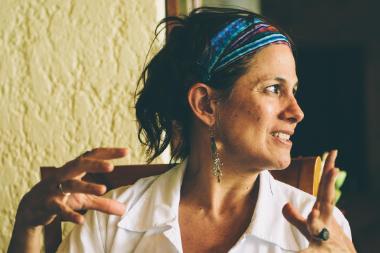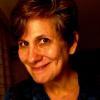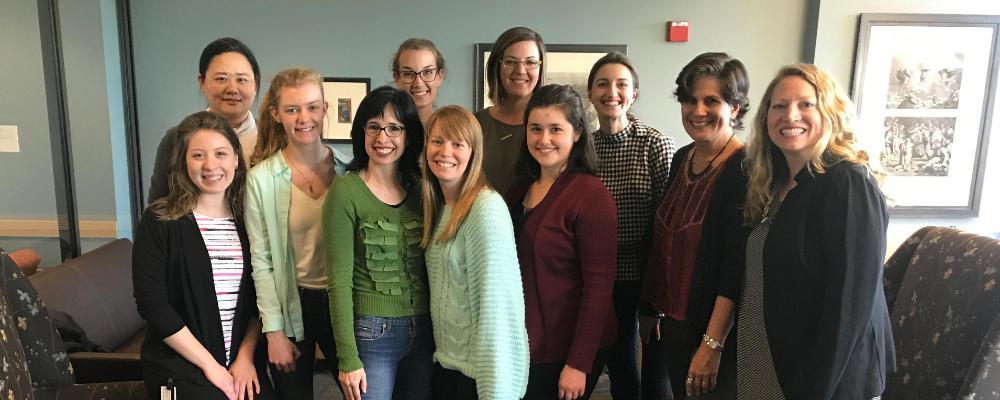June 25, 2019
Ruth Padilla DeBorst is John Stott Visiting Scholar at Wheaton College, where she is continuing her exploration on the theological reworking that needs to occur in order for Christians to step into our vocation as caretakers of God’s good creation. During the Spring 2019 Semester, she spent time, both in a group setting and in one-on-one conversations, with the women of the Bible and Theology Graduate Women's Fellowship. In these conversations, she answered some of their questions about vocation, education, theology, and her own experience at Wheaton College Graduate School as an International Student in the 1980s.
Q&A with Dr. Ruth Padilla Deborst
Question: You’re known as an interdisciplinary theologian whose work moves beyond the categories we typically use to define systematic theology. Can you talk a little bit about your particular approach to theology?
RPD: I’ve always had a love for literature and creative expression, and I grew up reading a lot—a lot. My dad’s a theologian, so his library was full of very heady books. But he also had a section of novels in his library, so I started picking up works by people like Dostoyevsky when I was pretty young. Since then, I’ve never lost the love for narrative, storytelling, and plot.
Today, I realize how much is lost when we don’t recognize the narrative quality of scripture and of our own lives.
In an attempt to build systems of thought, theology has largely abstracted ideas from the biblical story—cutting and pasting from the grand biblical narrative. In an attempt to construct organized systems of thought, categories, ideas, and doctrines, theology has been conceived as the process of extracting those things from the narrative, and then building the system. When we do theology this way, we take the life out of scripture and theology, and then we wonder why lives aren’t changed!
My approach is to look at scripture and life as narrative—as this story that we’re all “emplotted” in, that we’re all characters in. Who do we recognize as the central protagonist? Is it me, God, others? The world of literature is populated with people that have gone before us, whose beautiful insights and beautifully-crafted writings serve to awaken the imagination.
As I wrestled with the concepts and categories of systematic theology as a graduate student, I began reading people like C. S. Lewis, and had a significant mentor in a particular English professor, Dr. Joe McClatchey. Learning from those who were keenly aware of the value and the beauty of imagination shaped my own unique approach to theology.
Question: Your emphasis on narrative brings to mind last year’s Wheaton College Theology conference (2018), which focused on the theological implications of Marilynne Robinson’s novel, Gilead. During her keynote address, Robinson remarked jokingly that she was “almost a theologian.” Writing from the context of a woman and as one who values the power of narrative, what do you have to say about the way we "define" what it means to be a "theologian"?
 RPD: One way or another, we’re all doing theology!
RPD: One way or another, we’re all doing theology!
Even a person without any formal education is working to build bridges between life and God’s revelation and seeing how she or he fits into it—and that’s “doing theology.”
So, I resist making an elite out of the academy as the only space where theology is born. But then if you do go into the academy, as I did, and find a group of thinkers involved in more formal articulations, teaching, writing, then I think that again, the problem is not the conclusions or theses that the academy may put forward. Rather, the problems arise when we abstract theology from life, when we move beyond those formal conclusions and impose one mode of being, thinking, or speaking over against all others—codifying our theological language as if it were the only one that matters.
To me, theology loses its vocation if it’s not coming from and returning to life. It just becomes this inner circulation of ideas, not really Christian theology.
The vocation of Christians is to live in the world—and having a system of ideas isn’t enough to make that happen.
So, where do women fit in? Yes, in the history of theology there’s been too much of an emphasis on a particular currency or mode of theological communication that has privileged men. When we do that, we have categories like “feminist theology” or “contextual theology” or “practical theology” or “pastoral theology” as opposed to “proper theology” (which becomes coded language for “white, male, and Western theology!”). We (the theological community) need to get outside of that box.
Question: So, for you specifically, you knew systematics wasn’t enough. You wanted to live a bigger picture of what it means to be a theologian. How has that come to shape your work? How do you approach theology?
RPD: When I started graduate school, I realized how much I’d already been shaped theologically by the communities I had been a part of. My family, the Christian student movement, the Latin American Theological Fellowship: these were communities that had already been nourishing in me the capacity to articulate my theological insights. But they were also communities that were very embodied, grappling with the issues coming from life, living theology in real time and space. When I was in my teens was when Latin American countries were fighting with England over the islands we call Malvinas (and you might know as “Falkland Islands”). Suddenly the young men and women in my community had to grapple with ideas of violence, war, and faith in a very personal way. “Just War Theory?” No. In this situation, questions became less abstract and began to sound more like, “Will my boyfriend go and fight in a dispute we don’t even agree with?” In the face of this situation, where prominent leaders were blessing an effort we didn’t agree with, that’s where we started doing theology. It didn’t come from theoretical reflection—it came from life.
Ethics, mission, and theology are in one messy package and we can’t keep them separate. Being in those experiences and communities was where I first started doing the work of a theologian.
So, when I came to Wheaton for grad school, I wrestled a lot coming out of the context of a military dictatorship where I witnessed the dark side of U.S. interventions with Latin America first hand. I came with a lot of questions about how faith relates to life, to these issues, to people—real people. How does theology relate to the living world, not just to the world of ideas? The need for a Christian lifestyle isn’t just about abstract choices about drinking, dancing, and so on, rather it has everything to do with how we use our money, how we engage with people, how we treat the most vulnerable people in our societies, and how we grapple with issues of power. THAT’S lifestyle to me! Seeing that difference, too, was how I got into narrative theology.
Another growing place for me as a theologian was the international student community here at the grad school. My best friends at grad school were international students or people who had lived significant parts of their life outside of the United States. The questions we brought to the table were big, broad, global issues. So, to me, that’s another facet of growing as a theologian, asking, “Who is nourishing my growth, who is participating in it, who is helping me shape my questions?” Instead of finding a specific formula everything must conform to, it’s allowing conversation to constantly reshape and renew our doing of theology—something that’s alive and new every day.
Today, for me, a big part of my ongoing formation is the International Fellowship for Mission as Transformation (INFEMIT). We’re theologian practitioners: living out what we’re articulating. Theology for life. So, that means living theology out, intentionally, in our community in Costa Rica, making space for refugees to come in, and serving. It’s a constant questioning: as life challenges ideas and as ideas get embedded into life, that cycle of praxis is essential in doing theology.
Question: A major challenge the U.S. theological community is facing today is looking beyond the contentious conversation within our borders to those who are just outside or even waiting at our own borders. We have work to do in learning to share and make space, learning to join in conversation in a balanced way. Where do you find the balance between the local and the global? How do you maintain that balance as an Evangelical?
RPD: This brings me to the issue of power and assumptions about where and how God reveals God’s purposes. There’s this assumption that the powerful, the people with means, with established institutions and publishing houses—in short, people with power, hold the treasure trove of God’s revelation. Then they’re tasked to compassionately share it with others. There’s a problem there. About a century ago an Anglican Priest named Roland Allen wrote this book called Missionary Methods: St. Paul’s or Ours? To paraphrase one of his points, we have done much for the younger churches around the globe—we've done so much for them,but done very little with them. We see them as little children, not as brothers and sisters. The problem is not that we don’t trust them; it’s that we don’t trust the Holy Spirit! The assumption is that we, the powerful, think we own all the capital on truth... In God’s economy, God has not chosen to reveal Godself to the select few, but to people on the margins. A perfect example of this is Mary, the mother of Jesus. She was a young and poor woman from a remote corner of the Roman Empire. What does that say to our recognition of where God is at work and who we need to listen to? The majority of Christians are now in the global south, and we’re just starting to recognize this. There are finally attempts to listen to people in other parts of the world, and this is good. This shift in thinking obviously takes humility. Peter had to challenge the church in Jerusalem and say, “Hey, you know, it’s actually the same Spirit that’s at work in Cornelius!” (Acts 10). The temptation in countries like the U.S. is to fall for the white-gloved abuse of power. In the Latin American context in which I was raised and in which I continue to work, the gloves are off, and we see the abuse of power for what it is.
Question: Any final thoughts on your time as a student, perhaps especially keeping our International Students in mind?
RPD: As an international student, it was not easy: there was culture shock. I knew the language, but the cultural matrix was so foreign to me (or I was foreign to it). There was an International Student Fellowship in those days, where we would get together and share our blunders and struggles. But our experience even there was so broad. For example, coming from Latin America, I naturally just hugged and kissed everyone. But one of my Asian friends said, “Ruth, don’t you think you’re being a bit too forward?” In my second year I walked with my eyes down and my hands at my side. Having a group of friends who could laugh at our own process rather than being stressed about it was extremely helpful. To be honest, my best friends were international, and then a few of those American students who entered into fellowship of their own choice—one of them being the man I later married (but that’s another story for another time!). I made lifelong friends in this group. To international students, I’d say, find that community together, encourage one another, laugh together.
For the Anglo-American students, I'd say, grab the opportunity now, you have the world here. You can connect, interact, and learn from the diversity of the world and learn better to connect with the diversity that truly already exists within your borders! Allow this diverse community to serve you in opening up the practice of bridging and expanding your theological horizons. - Hannah Hempstead
----
About Dr. Ruth Padilla DeBorst
 Dr. Ruth Padilla DeBorst is John Stott Visiting Scholar at Wheaton College, where she is continuing her exploration on the theological reworking that needs to occur in order for Christians to step into our vocation as caretakers of God’s good creation. Dr. Padilla DeBorst yearns to see peace and justice embrace in the beautiful and broken world we call home. A wife of one and mother of many, theologian, missiologist, educator, and story-teller, she has been involved in leadership development and theological education for integral mission in her native Latin America for several decades. As Leader of Missional Leadership with Resonate Global Mission, she works with the Comunidad de Estudios Teológicos Interdisciplinarios (CETI: a learning community with students across Latin America), and coordinates the Networking Team of INFEMIT (International Fellowship for Mission as Transformation), among other things. She serves on the board of A Rocha, the Oxford Centre for Mission Studies and the American Society of Missiology. She lives with her husband, James, in Costa Rica as a member of Casa Adobe, an intentional Christian Community with deep concern for right living in relation to the whole of creation (www.casaadobe.org). Her studies include a Bachelors in Education (Argentina), an M.A. from Wheaton College, and a Ph.D. in Theology (Boston University).
Dr. Ruth Padilla DeBorst is John Stott Visiting Scholar at Wheaton College, where she is continuing her exploration on the theological reworking that needs to occur in order for Christians to step into our vocation as caretakers of God’s good creation. Dr. Padilla DeBorst yearns to see peace and justice embrace in the beautiful and broken world we call home. A wife of one and mother of many, theologian, missiologist, educator, and story-teller, she has been involved in leadership development and theological education for integral mission in her native Latin America for several decades. As Leader of Missional Leadership with Resonate Global Mission, she works with the Comunidad de Estudios Teológicos Interdisciplinarios (CETI: a learning community with students across Latin America), and coordinates the Networking Team of INFEMIT (International Fellowship for Mission as Transformation), among other things. She serves on the board of A Rocha, the Oxford Centre for Mission Studies and the American Society of Missiology. She lives with her husband, James, in Costa Rica as a member of Casa Adobe, an intentional Christian Community with deep concern for right living in relation to the whole of creation (www.casaadobe.org). Her studies include a Bachelors in Education (Argentina), an M.A. from Wheaton College, and a Ph.D. in Theology (Boston University).
